Datasheet
Year, pagecount:2009, 2 page(s)
Language:English
Downloads:2
Uploaded:May 07, 2018
Size:734 KB
Institution:
-
Comments:
Attachment:-
Download in PDF:Please log in!
Comments
No comments yet. You can be the first!Most popular documents in this category
Content extract
Source: http://www.doksinet 98 p o lit o l o g i j a 2 0 0 9 / 1 ( 5 3 ) ISSN 1392–1681 The conflict of liberalism and democracy Alvydas Jokubaitis The term “liberal democracy” hides the conflict of two different philosophies. Liberal metaphysics is based on the idea of thing, while democracy is based on the idea of action and process. Liberal political philosophy aims at circumscription of political power. The aim of democracy is self-government of the citizens There is a fundamental conflict between liberal individualism and general will of democracy In discussions about democracy there is always some confusion about the role of liberalism and democracy. Contemporary theoreticians of democracy do not want to admit that the drawbacks of liberal political philosophy necessarily become the weaknesses of democracy. The drawing of demarcation lines between the spheres of influence of democracy and liberalism today is the main goal of the theory of democracy. On politics and
values Ainis Razma The paper disputes the thesis of Jokubaitis’s article “Politics Without Values”, that purely political understanding of things is impossible for there are no purely political values. Therefore no decision could be based on purely political values Razma argues that values as well as politics are not things but phenomena, which together make up a system where the former make its elements and the latter constitute the process. For analytical purposes Source: http://www.doksinet 99 the system can be dissembled into component parts, but the conclusions of analysis must refer to the systematic nature of the relationship between the parts. The politics as an axiological process is impossible without values, and any value can only gain acknowledgement through the process of politics. Therefore, the politics is always axiological, and common values of any society are always political. Virtual public spheres in Lithuania: the politicizing effect of the internet Inga
Vinogradnaitė Aim of the article is to explore whether existing possibilities to join online political discussions have any politicizing effect on social networks. Politicizing effect is defined both in quantitative and qualitative terms Internet may enlarge existing networks by providing opportunities to connect to new people and to engage with them in political conversations. Internet may also provide new experiences of political talk, assuming that offline political conversations tend to avoid disagreement, while online communication is better adapted to expression of divergent opinions and discussions. Yet such potential of the Internet to expose people to cross-cutting conversation depends on the motivations of its users. To explore the actual effect of the Internet on politicization of social networks data of representative survey of Lithuanian population is analyzed
values Ainis Razma The paper disputes the thesis of Jokubaitis’s article “Politics Without Values”, that purely political understanding of things is impossible for there are no purely political values. Therefore no decision could be based on purely political values Razma argues that values as well as politics are not things but phenomena, which together make up a system where the former make its elements and the latter constitute the process. For analytical purposes Source: http://www.doksinet 99 the system can be dissembled into component parts, but the conclusions of analysis must refer to the systematic nature of the relationship between the parts. The politics as an axiological process is impossible without values, and any value can only gain acknowledgement through the process of politics. Therefore, the politics is always axiological, and common values of any society are always political. Virtual public spheres in Lithuania: the politicizing effect of the internet Inga
Vinogradnaitė Aim of the article is to explore whether existing possibilities to join online political discussions have any politicizing effect on social networks. Politicizing effect is defined both in quantitative and qualitative terms Internet may enlarge existing networks by providing opportunities to connect to new people and to engage with them in political conversations. Internet may also provide new experiences of political talk, assuming that offline political conversations tend to avoid disagreement, while online communication is better adapted to expression of divergent opinions and discussions. Yet such potential of the Internet to expose people to cross-cutting conversation depends on the motivations of its users. To explore the actual effect of the Internet on politicization of social networks data of representative survey of Lithuanian population is analyzed
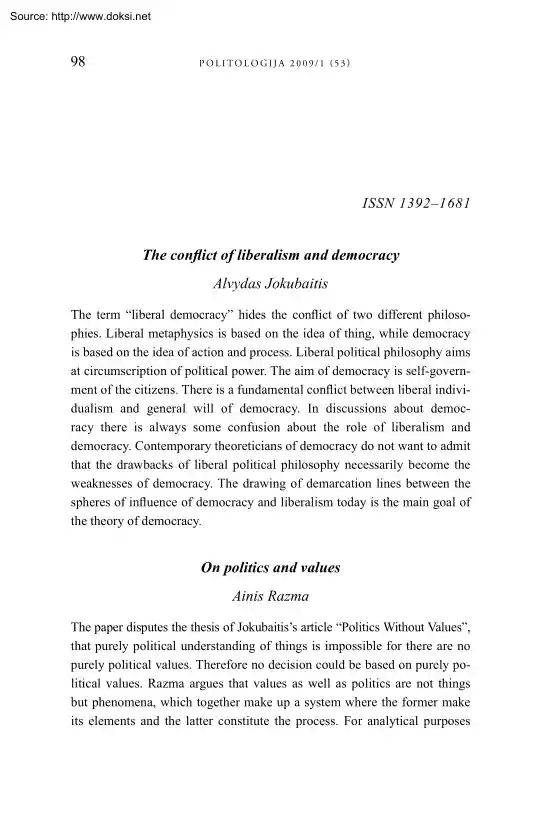
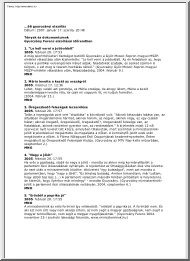
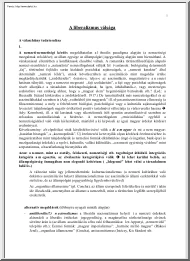
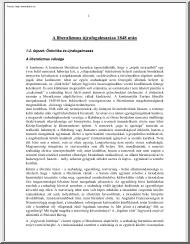
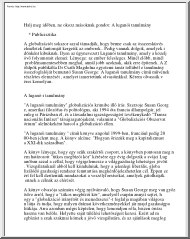
 When reading, most of us just let a story wash over us, getting lost in the world of the book rather than paying attention to the individual elements of the plot or writing. However, in English class, our teachers ask us to look at the mechanics of the writing.
When reading, most of us just let a story wash over us, getting lost in the world of the book rather than paying attention to the individual elements of the plot or writing. However, in English class, our teachers ask us to look at the mechanics of the writing.